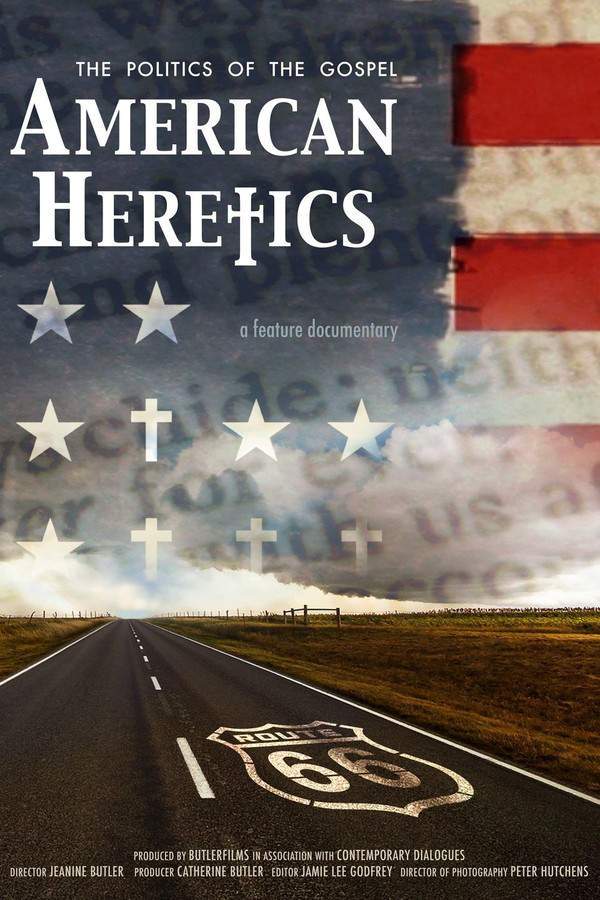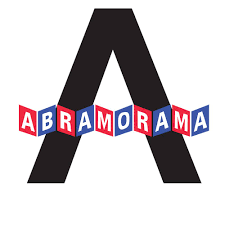
American Heretics: The Politics of the Gospel 2019
Directed by

Jeanine Isabel Butler
Made by

Abramorama
Test your knowledge of American Heretics: The Politics of the Gospel with our quiz!
American Heretics: The Politics of the Gospel Plot Summary
Read the complete plot summary and ending explained for American Heretics: The Politics of the Gospel (2019). From turning points to emotional moments, uncover what really happened and why it matters.
At no other time in our history has the intersection of church and state become so complicated and divisive. We are now in an era where the power of negative partisanship has placed us into distinct camps defined by race and religion. According to Dr. Robert Jones, the leader of the Public Religion Research Institute, this results in a scenario where “the two parties have exploited race and religion, two of the most visceral things you can think of in terms of the human experience, and they’ve locked them in partisan identities.”
American Heretics: The Politics of the Gospel takes viewers deep into the heart of the Bible Belt, featuring a courageous assembly of ministers, congregations, and community leaders who boldly confront entrenched fundamentalist Christian doctrines in pursuit of a Gospel of Inclusion. These individuals, oftentimes labeled as “heretics” for their progressive beliefs and actionable initiatives, steadfastly refuse to let their faith be weaponized through literal interpretations of the Bible. This is especially true for those interpretations that improperly legitimize nationalism and undermine crucial civil rights advancements for women, minorities, immigrants, and LGBTQ individuals.
This impactful narrative invites us to reconsider our perceptions of the Christian heartland by providing an intimate look into the fraught and often misinterpreted history of religion, race, and politics in the United States. The Heretics portrayed in this documentary remain committed to rescuing humanity from a far more insidious hell—one characterized by poverty, discrimination, and nationalism, which ultimately oppresses “…those who are the least among us.”
American Heretics: The Politics of the Gospel Timeline
Follow the complete movie timeline of American Heretics: The Politics of the Gospel (2019) with every major event in chronological order. Great for understanding complex plots and story progression.
Introduction of the Issue
The documentary begins by addressing the complex relationship between church and state in contemporary society. It highlights how negative partisanship has divided people into distinct camps often defined by race and religion.
Expert Commentary
Dr. Robert Jones, a prominent figure from the Public Religion Research Institute, shares insights about the exploitation of race and religion in American politics. His commentary underlines how these elements have become entwined with partisan identities, affecting public discourse and individual beliefs.
The Bible Belt Setting
Viewers are taken deep into the heart of the Bible Belt, a region known for its strong fundamentalist Christian beliefs. This setting serves as a backdrop for uncovering the realities faced by those who challenge traditional doctrines.
Emergence of Progressive Beliefs
The narrative introduces a brave assembly of ministers and community leaders who advocate for a Gospel of Inclusion. These individuals often find themselves labeled as 'heretics' due to their progressive beliefs that challenge established norms.
Confronting Fundamentalism
The so-called 'heretics' confront entrenched fundamentalist doctrines, emphasizing a more inclusive interpretation of the Bible. Their efforts reflect a deep commitment to civil rights and social justice, resisting interpretations that fuel division.
Resistance to Literalism
The documentary highlights the refusal of these leaders to accept literal interpretations of the Bible that legitimize nationalism and undermine civil rights. This critical perspective promotes a more compassionate and inclusive theology.
Focus on Civil Rights
The community leaders actively address issues that disproportionately affect marginalized groups. Their initiatives aim to promote the rights of women, minorities, immigrants, and LGBTQ individuals, drawing attention to the need for social change within their communities.
Reconsidering Perceptions
As the narrative unfolds, viewers are invited to reconsider their perceptions of the Christian heartland. The film challenges stereotypes and provides a more nuanced understanding of the intersection of faith, race, and politics.
Intimate Portraits
Through intimate interviews and personal stories, the documentary paints a vivid portrait of the heretics. Their collective experiences underscore the challenges they face as they work to redefine faith in a rapidly changing societal landscape.
Struggle Against Oppression
The heretics articulate their resistance to societal issues such as poverty and discrimination. They frame their struggle as a moral imperative, striving to uplift those who are most vulnerable.
The Insidious Hell
The documentary concludes with a compelling argument that the 'insidious hell' is characterized by systemic inequality. The heretics work diligently to combat nationalism and discrimination, striving for a future where all individuals are valued.
Call to Action
The film ends with a powerful call to action, encouraging viewers to reflect on their beliefs and engage in dialogue. It emphasizes the need for collective efforts to promote a Gospel of Inclusion that transcends partisan divides.
American Heretics: The Politics of the Gospel Characters
Explore all characters from American Heretics: The Politics of the Gospel (2019). Get detailed profiles with their roles, arcs, and key relationships explained.
Dr. Robert Jones
Dr. Robert Jones is a pivotal figure who critiques the relationship between religion and politics in contemporary America. As the leader of the Public Religion Research Institute, he provides insights on how race and religion have been manipulated by political parties to create divisive identities.
American Heretics: The Politics of the Gospel Settings
Learn where and when American Heretics: The Politics of the Gospel (2019) takes place. Explore the film’s settings, era, and how they shape the narrative.
Time period
The film addresses contemporary social challenges where the intersection of religion and politics has become increasingly divisive. This scenario reflects a current United States shaped by negative partisanship and the struggle for racial and religious inclusivity.
Location
Bible Belt, United States
The Bible Belt is a region of the United States known for its strong evangelical Protestant culture and church attendance. It often serves as a focal point for discussions about the interplay of religion and politics, particularly regarding social issues and civil rights.
American Heretics: The Politics of the Gospel Themes
Discover the main themes in American Heretics: The Politics of the Gospel (2019). Analyze the deeper meanings, emotional layers, and social commentary behind the film.
🕊️
Inclusion
The film explores the theme of inclusion through the portrayal of heretical faith leaders who advocate for a Gospel of Inclusion. They challenge traditional dogma, striving for acceptance and understanding among diverse communities, including women, minorities, and LGBTQ individuals.
⚖️
Social Justice
Social justice is a crucial theme as the documentary examines how religious ideologies can either advance or hinder civil rights. The narrative emphasizes the commitment to fighting against discrimination, poverty, and nationalism, presenting a powerful call for equity.

Coming soon on iOS and Android
The Plot Explained Mobile App
From blockbusters to hidden gems — dive into movie stories anytime, anywhere. Save your favorites, discover plots faster, and never miss a twist again.
Sign up to be the first to know when we launch. Your email stays private — always.
American Heretics: The Politics of the Gospel Spoiler-Free Summary
Discover the spoiler-free summary of American Heretics: The Politics of the Gospel (2019). Get a concise overview without any spoilers.
In the rolling plains of Oklahoma, the Bible Belt’s familiar hymns echo alongside the hum of a restless question: what does faith look like when it refuses to be a weapon? The film opens on sun‑baked towns where steeples dominate skylines and every porch conversation bends toward politics and prayer. A pervasive sense of history hangs heavy—yet underneath, a quiet current of dissent begins to stir, hinting at a community poised on the edge of transformation.
At the heart of this stir are a network of ministers, congregations, and community activists who have earned the uneasy label of “heretics.” United by a shared conviction that the Gospel can—and should—be a force for compassion rather than division, they champion a radical humility that places social justice at the centre of worship. Their gatherings blend sermon, song, and activist strategy, creating a tapestry of belief that challenges literalist readings that have long justified nationalism, discrimination, and the marginalization of women, immigrants, and LGBTQ individuals. Their leader‑figure, Dr. Robert Jones, provides a scholarly lens, framing their struggle within the broader clash of church and state that defines the nation’s current partisan fault lines.
The documentary’s tone is intimate and observant, capturing the soft rustle of prayer books beside the clatter of community meetings. Cinematography lingers on weather‑worn church doors, the glow of stained glass, and the earnest faces of those who dare to reinterpret sacred texts. A steady, empathetic narration invites viewers to feel the tension between reverence for tradition and the urgent call for inclusion, never slipping into didactic preaching but instead fostering a space for contemplation.
As the film unfolds, it hints at a quiet revolution brewing in the heart of America’s spiritual heartland. The audience is drawn into a world where faith, politics, and humanity intersect, leaving a lingering curiosity: how far can a community go when it chooses love over division, and what ripples might that choice send across the broader cultural landscape?
Can’t find your movie? Request a summary here.
Featured on this page

What's After the Movie?
Not sure whether to stay after the credits? Find out!
Explore Our Movie Platform
New Movie Releases (2026)
Famous Movie Actors
Top Film Production Studios
Movie Plot Summaries & Endings
Major Movie Awards & Winners
Best Concert Films & Music Documentaries
Movie Collections and Curated Lists
© 2026 What's After the Movie. All rights reserved.





